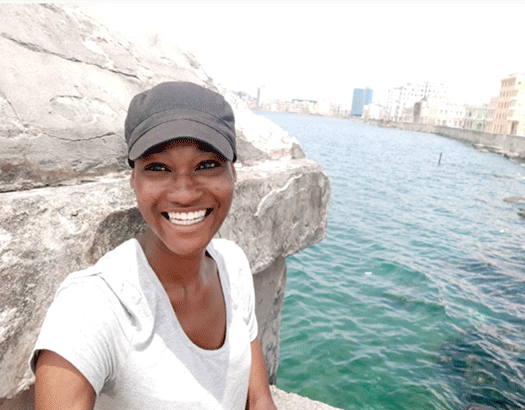“Recalling Runaways: Studies of Slavery and Absenteeism in Cuba,” by Aziza N. Baker, Tinker Grantee, Department of History
My research is two-fold. The first project uncovers how enslaved Africans fought to redefine the contours of their bondage during the nineteenth century, a period in which Cuban slavery grew exponentially. The second project explores Afro-Cuban politics and political movements during the formation of the Cuban republic in the early twentieth century.

The first project uses runaway slave advertisements in Diario de la Habana to catalog the demographic backgrounds of runaway enslaved bondsmen from 1810-1815. The data compiled from this first step is then cross-indexed against advertisements for the purchase, renting, or selling of enslaved people of the same demographic indicators. In this way, my research will be able to determine how and why certain groups of enslaved individuals were more likely to resist their status through flight versus self-purchase or other forms of non-violent confrontation.
The second step, which compares the personal data collected from the runaway ads and the purchase ads, will also allow me to ascertain the “economic” value of certain demographic groups based on their age, gender, skill sets, and ethnicity, information that will prove invaluable when assessing why and how certain enslaved peoples selected to engage distinct resistance strategies.
Finally, because my work coincides with the Aponte Rebellion of 1812, the first anti-imperial and anti-slavery rebellion in Cuba, it builds upon previous works that examine enslaved bondsmen resistance in Cuba as determined by the increasingly interconnected Atlantic world.
The second project engages conversations regarding Afro-Cuban intellectual thought between 1904-1912. Slavery in Cuba had been abolished since 1886, and in 1898 Cuba won its independence from Spain and shortly thereafter became a U.S. protectorate; therefore, by 1904, one of the most contentious issues that Cuba faced was the status of black Cubans in the new republic. Two Cuban newspapers, El Nuevo Criollo and Prevision, represented opposing strategies for improving the status of Afro-Cubans. Prevision was founded by some of the most prominent members of the first black political party in the Western hemisphere, while Rafael Serra’s El Nuevo Criollo condemned anti-black racism but was politically moderate. My research uses the complete collection of these two periodicals to develop a comprehensive analysis of the intellectual debates that defined the position of black Cubans on the cusp of Cuban independence from Spain and the abolition of slavery.
The month I spent in Havana conducting research was guided by my predeparture preparation and travel tips that I learned while abroad. As a master’s history student at the University of Oregon, I engaged in several courses regarding slavery in Latin America and Latin American History. I also participated in language preparation activities and completed a directed readings course on nineteenth century Cuba under the direction of my advisor, Dr. Carlos Aguirre. Furthermore, as a Fulbright scholar, I leveraged my experiences living abroad in Latin America to help me navigate bureaucratic differences.
For anyone who is thinking of conducting research in Cuba, I highly recommend reaching out to a contact at the intended archive or museum. It was only through the guidance of Dr. Tómas Fernández Robaina that I was able to access the invaluable periodical sources I required at the Biblioteca Nacional in Havana, Cuba. I would also recommend visiting several of the museums in Havana. At the Museo Nacional de Bellas Artes de Cuba and the memorial dedicated to José Martí, I was able to review political cartoons, maps and other vital information. Research in a different country can seem daunting, but with the support of a contact and the willingness to visit various archives and museums, it can prove quite productive.
—Aziza N. Baker received a 2019-20 Tinker Field Research Grant through CLLAS. A second-year master’s student in the UO Department of History, she earned her B.A. in Spanish and Portuguese literature from UC Berkeley. In 2016, Baker completed a Fulbright Scholarship to Brazil.
